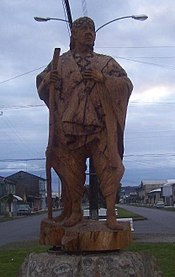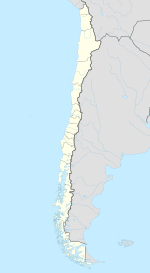Nueva Imperial
| Nueva Imperial | |||||
|---|---|---|---|---|---|
| City and Commune | |||||

Monument to Cacique Lemunao in Nueva Imperial
|
|||||
|
|||||
| Coordinates (city): 38°44′36″S 72°57′0″W / 38.74333°S 72.95000°WCoordinates: 38°44′36″S 72°57′0″W / 38.74333°S 72.95000°W | |||||
| Country | Chile | ||||
| Region | Araucanía | ||||
| Province | Cautín | ||||
| Founded | 1551 | ||||
| Government | |||||
| • Type | Municipality | ||||
| Area | |||||
| • Total | 732.5 km2 (282.8 sq mi) | ||||
| Elevation | 20 m (70 ft) | ||||
| Population (2012 Census) | |||||
| • Total | 29,366 | ||||
| • Density | 40/km2 (100/sq mi) | ||||
| • Urban | 18,335 | ||||
| • Rural | 21,724 | ||||
| Sex | |||||
| • Men | 20,423 | ||||
| • Women | 19,636 | ||||
| Time zone | CLT (UTC−4) | ||||
| • Summer (DST) | CLST (UTC−3) | ||||
| Area code(s) | country + city = 56 + 45 | ||||
| Climate | Csb | ||||
| Website | Municipality of Nueva Imperial | ||||
Nueva Imperial is a city and commune in the south of Chile. It is located in Cautín Province in the Araucanía Region. Nueva Imperial lies about 35 km (22 mi) to the west of Temuco, the regional capital.
Nueva Imperial is located in a region with abundant natural resources: volcanoes, mountains, rivers, hot springs, valleys, and native forests, which include stands of araucaria trees. The city is traversed by the Chol-Chol and Cautín Rivers, which together form the Imperial River. The Imperial River flows into the Pacific Ocean at the town of Puerto Saavedra. Both are navigable by boat and support fishing for trout and other species as well as canoeing and kayaking.
What is now the city of Nueva Imperial was founded in 1551 by Pedro de Valdivia, the Spanish conquistador, under the name La Imperial. He intended it to be one of the most important cities in colonial Chile, perhaps even the capital of the country. However, it was destroyed twice by the local indigenous population, the Mapuche. It was totally abandoned in 1599 because of the attacks.
In 1882, a new city was built on the site called Carahue (in Mapudungun, the language of the Mapuches, the name means “The City that Was”). That same year, Imperial was refounded about 12 miles from the original location and renamed Nueva Imperial (New Imperial). 8 miles from Nueva Imperial one can find vestiges of the old Spanish fort Boroa.
Cacique (Chief) Lemunao was the leader of the people in the area. He sold the land that later became Nueva Imperial to the Spanish. Today, there is a wooden monument to him on the edge of the city. It stands 6.5 feet tall.
...
Wikipedia



